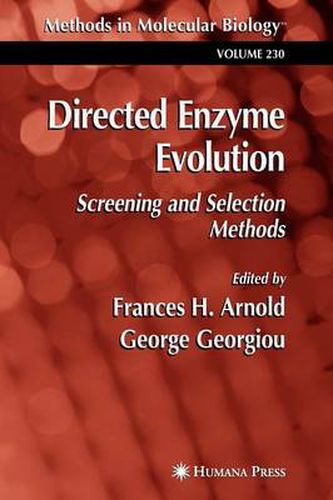Readings Newsletter
Become a Readings Member to make your shopping experience even easier.
Sign in or sign up for free!
You’re not far away from qualifying for FREE standard shipping within Australia
You’ve qualified for FREE standard shipping within Australia
The cart is loading…






This title is printed to order. This book may have been self-published. If so, we cannot guarantee the quality of the content. In the main most books will have gone through the editing process however some may not. We therefore suggest that you be aware of this before ordering this book. If in doubt check either the author or publisher’s details as we are unable to accept any returns unless they are faulty. Please contact us if you have any questions.
Seasoned practitioners from many leading laboratories describe their best readily reproducible screening strategies for isolating useful clones. These techniques have been optimized for sensitivity, high throughput, and robustness, and are of proven utility for directed evolution purposes. The assays presented use a variety of techniques, including genetic complementation, microtiter plates, solid-phase screens with colorimetric substrates, and flow cytometric screens. An accompanying volume, Directed Evolution Library Creation: Methods and Protocols (ISBN 1-58829-285-1), describes readily reproducible methods for the creation of mutated DNA molecules and DNA libraries. Copy for Both Volumes Directed Evolution Library Creation: Methods and Protocols and Directed Enzyme Evolution: Screening and Selection Methods constitute an extraordinary collection of all the key methods used today for directed evolution research. Described in step-by-step detail to ensure robust experimental results, these methods will enable both newcomers and more experienced investigators to design and implement directed evolution strategies for the engineering of novel proteins. The first volume describes methods for the creation of mutated DNA molecules, or DNA libraries, encoding variants of desired proteins. The second volume describes methods for screening DNA libraries to isolate mutant proteins that exhibit a specified function.
$9.00 standard shipping within Australia
FREE standard shipping within Australia for orders over $100.00
Express & International shipping calculated at checkout
This title is printed to order. This book may have been self-published. If so, we cannot guarantee the quality of the content. In the main most books will have gone through the editing process however some may not. We therefore suggest that you be aware of this before ordering this book. If in doubt check either the author or publisher’s details as we are unable to accept any returns unless they are faulty. Please contact us if you have any questions.
Seasoned practitioners from many leading laboratories describe their best readily reproducible screening strategies for isolating useful clones. These techniques have been optimized for sensitivity, high throughput, and robustness, and are of proven utility for directed evolution purposes. The assays presented use a variety of techniques, including genetic complementation, microtiter plates, solid-phase screens with colorimetric substrates, and flow cytometric screens. An accompanying volume, Directed Evolution Library Creation: Methods and Protocols (ISBN 1-58829-285-1), describes readily reproducible methods for the creation of mutated DNA molecules and DNA libraries. Copy for Both Volumes Directed Evolution Library Creation: Methods and Protocols and Directed Enzyme Evolution: Screening and Selection Methods constitute an extraordinary collection of all the key methods used today for directed evolution research. Described in step-by-step detail to ensure robust experimental results, these methods will enable both newcomers and more experienced investigators to design and implement directed evolution strategies for the engineering of novel proteins. The first volume describes methods for the creation of mutated DNA molecules, or DNA libraries, encoding variants of desired proteins. The second volume describes methods for screening DNA libraries to isolate mutant proteins that exhibit a specified function.